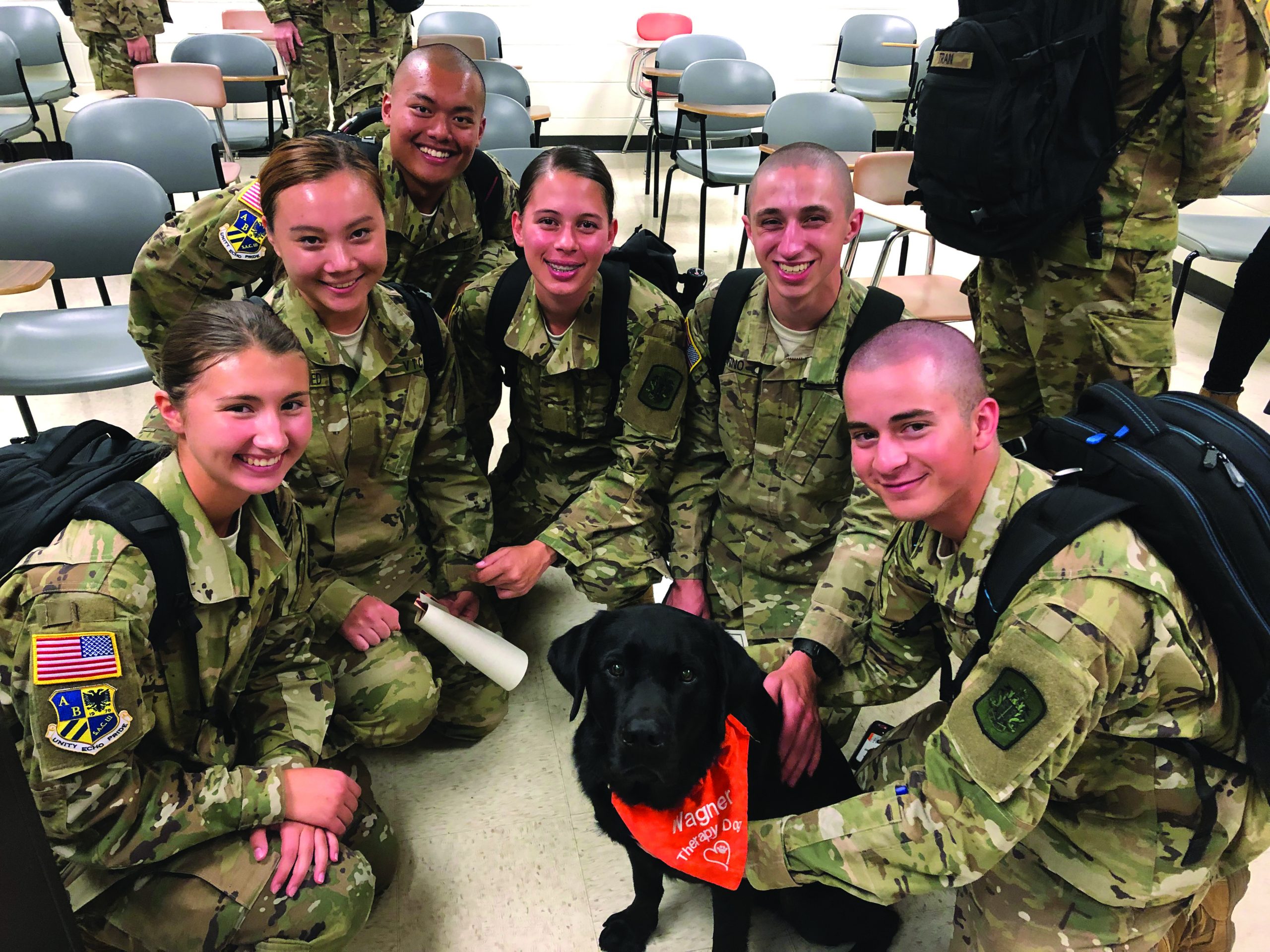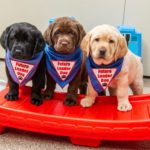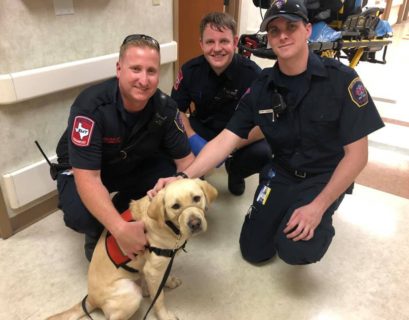The Corp of Cadets with Wagner (Photo courtesy of Sarah Dunleavy)
Four Labs Offer Comfort and Smiles as Therapy Dogs at Virginia Tech
by Jen Reeder
The graduation ceremonies for Virginia Polytechnic Institute and State University (a.k.a. Virginia Tech) were unusual in May of 2020. For starters, the event was virtual due to the coronavirus pandemic, as was the case at many higher-learning institutions across the country. Plus, a yellow Lab named Moose received an honorary doctorate from the veterinary college for seven years of service to the campus.
Moose is one of four canine faculty members of Virginia Tech’s Thomas E. Cook Counseling Center, which provides mental health services to students. Like Moose, who kicked off the therapy dog program in 2013, all of the dogs are Labs who have become beloved by students, faculty, and the community.
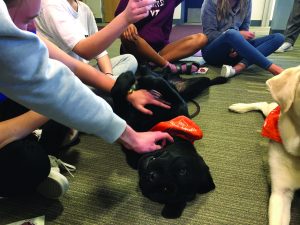
Wagner sort of loves his job. (Photo courtesy of Sarah Dunleavy)
Trent Davis, PhD, coordinator of the animal-assisted therapy program, said the Labs – Moose, Derek, Wagner, and Carson – are all sweet and extremely well-trained. Three of the four were originally trained to be service dogs with Guiding Eyes for the Blind in New York but placed out due to minor medical issues. Wagner, the program’s sole black Lab, trained with Service Dogs of Virginia and was placed with Virginia Tech as a facility dog in 2018.
Still, they each have distinct personalities. Carson is the biggest in size and goofiness, so he’s kind of like Marmaduke, Davis said. Wagner is the “magician” because he was trained as a mobility and PTSD service dog. He can open and close doors, retrieve dropped items, and interrupt common anxiety symptoms like a nervous leg bounce or body language that signals social withdrawal.
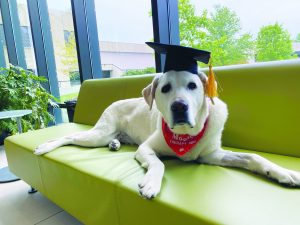
“Dr.” Moose.
Then there are his own dogs, Moose and Derek. “Moose is the Buddha because he’s the calmest dog you’ll ever meet. He hasn’t barked this year,” he said. “Derek is the lover. He would be in a fraternity and get all Cs, but you’d love him because he’d be the first one to the party and the last one to leave – and whatever you needed, he’d be honest with you and be there for you. So he’s the lover.”
The Labs all work full time with their handlers in the counseling center visiting with clients in over 1,000 sessions each year. In normal times, they are popular fixtures wandering around campus, greeting students in residence halls, attending alumni picnics, and mingling with crowds at sporting events.
During the pandemic, the team has gotten creative, with daily posts on social media. One popular game is “Where’s Derek?” Davis posts a photo of Derek somewhere on campus, and students guess where he is. The winner gets a self-care package as well as the chance to meet Derek and take a photo posted on Instagram. The posts are fun for the students and also subtly remind them to wear masks, like the students in photos with Derek, and to follow coronavirus protocols.
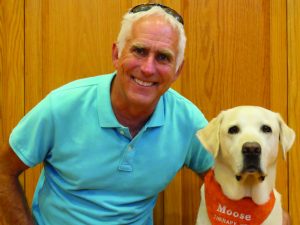
Trent Davis and Moose
Davis said the Labs are extremely helpful in counseling sessions by putting students at ease and helping them to trust him. “College kids are a lot more stressed in this generation,” he said. “They connect with these dogs, and it never ceases to amaze me that they feel with these dogs they’re safe, and that it’s almost like a feeling of home for a lot of them.”
Moose also offers inspiration to people struggling with personal issues because he has battled prostate cancer since February 2020. He’s getting top-notch care from the university’s veterinary college and has outlived his prognosis while care packages and notes of concern flood in from the community.
“I think that he really is helping our students, even the ones he’ll never do therapy with, because they’re seeing this very noble being struggling very courageously,” he said. “Since he’s been sick, the outpouring of care and gifts and just general well-wishes has been overwhelming.”
The Lab is also inspiring strangers. Recently at a store, Moose met a young woman on emergency leave from school. “She ended up lighting up when she met Moose,” he recalled. “She took pictures with him and bought him a toy, and then her mom took me aside and said, ‘This was a godsend because she was so stressed out and said nothing good ever happens to her. Now she’s thrilled.’”
Those sorts of interactions lead Davis, who grew up with Labs himself, to frequently quip, “There’s a reason why Labs are the most popular dog breed.” He said they’re terrific therapy dogs because of their temperament, work ethic, non-threatening appearance, and eagerness to please.
“The most profound thing that has ever happened to me professionally is to see the influence of these guys, just being what they are: loving, caring, real creatures without much pretense and no judgement of you.”
The dogs all love their jobs, which is critically important to Davis. He vowed at the start of the program to never force the dogs to interact; if they’d prefer to snooze during a session instead of, say, perform tricks for a client, that’s just fine.
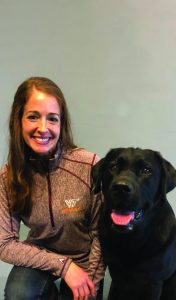
Sarah Dunleavy and Wagner (Photo courtesy of Sarah Dunleavy)
“I wouldn’t do this if it didn’t help the dogs as well,” he said. “The best part of this work is seeing how it benefits humans. But the very, very best part of it is watching these dogs be happy.”
Davis said the dogs also help prevent burnout for the counselors themselves. His colleague Sarah Dunleavy, a resident in counseling at the center, agrees. She handles Wagner, the black Lab, who assists her with individual, group, and couples therapy. The Lab’s signature move is bringing a box of tissues to people who cry.
“Our bond has helped me as a therapist,” she said. “Even though I’m the one handing out the treats, he’s the treat in my day. He is like my partner. In the morning when I get up and I know it’s going to be a long day and I’m going to be helping a lot of people who are going through a lot, he’s up and wagging his tail and stretching, essentially saying, ‘This is going to be a great day!’ He motivates me and inspires me to wake up feeling the same way. He’s a treasure.”
Follow the Virginia Tech therapy dogs on Instagram at: www.instagram.com/vttherapydogs

